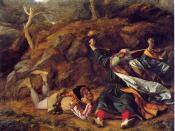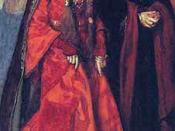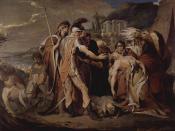'There's a divinity that shapes our ends, rough hew them how we will.' These words from Hamlet are echoed, even more pessimistically, in Shakespeare's later play, The Tragedy of King Lear where Gloucester says: 'Like flies to wanton boys, are we to the gods, they kill us for their sport'. In Lear, the characters are subjected to the various tragedies of life over and over again.
An abundance of cyclic imagery in Lear shows that good people are abused and wronged regardless of their own noble deeds or intentions. Strapped to a wheel of fire, humans suffer and endure, prosper and decline, their very existence imaged as a voyage out and a return. The movement from childhood to age and back again, the many references to fortune whose wheel spins humans downward even as it lifts, the abundance of natural cycles which are seen as controlling experience, even perhaps the movement of play itself from order to chaos to restoration of order to division again.
Throughout the text, the movements of celestial bodies are used to account for human action and misfortune. Just as the stars in their courses are fixed in the skies, so do the characters view their lives as caught in a pattern they have no power to change. Lear sets the play in motion in banishing Cordelia when he swears 'by all the operation of the orbs from whom we exist and cease to be' that his decision 'shall not be revoked'. How like the scene in Julius Caesar wherein Caesar says 'For I am constant as the Northern star' Lear vows to be resolute but dies regretting his decision at the hands of his daughters who claim love him 'more than word can wield' and are 'alone felicitate' in his presence.
That Edmund disbelieves in...


